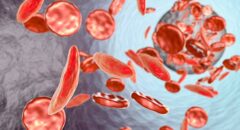
Sickle Cell Disease (SCD) and Sickle Cell Trait (SCT) are often confused. While they are related, they’re actually two different genetic conditions. And getting to the bottom of these differences is key to effective disease management.
For Black folks, increased understanding and awareness can make a world of difference. After all, Sickle Cell Disease and Sickle Cell Trait are especially problematic for people of African descent. With roughly 1 in 13 Black babies born with SCT, and roughly 1 in 365 Black babies born with SCD, these prevalences cannot be ignored.
Let’s cover the main features of SCD and SCT, where they differ and where they overlap.
Symptoms Vary
With the disease, sufferers will experience chronic symptoms. These are caused by sickle-shaped red blood cells that can clog up blood flow and break apart. This, in turn, can lead to severe pain and damage to tissues and organs. As a result, sufferers will experience both long-term and short-term symptoms.
The short-term symptoms of SCD are infections, stroke, and pain crises. The long-term effects are lack of red blood cells (anemia), fatigue, and skin tone change.
With Sickle Cell Trait (SCT), it’s different.
SCT is mostly asymptomatic, so people with the trait will not have any severe problems. What they do have is a single copy of the sickle cell gene. Because they also have one normal gene, their red blood cells will be normal too.
That said, extreme conditions can lead to symptoms in people with SCT. Extreme dehydration, very high altitudes, and over-the-top exertion can cause issues. The most common symptoms from these factors include bloody urine and the breakdown of muscle.
Overall, SCD greatly impacts overall health and living while SCT does not. With SCD, frequent complications and hospitalizations are possible. Lifespan may also be reduced. With SCT, however, life expectancy remains normal and health problems are minimal or nonexistent.
RELATED: Sickle Cell Disease and Blood Transfusion: What You Should Know
Genetic Factors
You also gotta consider the genetic differences between the conditions. Again, while people with Sickle Cell Disease (SCD) have two sickle cell genes, people with Sickle Cell Trait (SCT) only inherit one of those abnormal genes. That said, people with SCT can pass the disease to their children even though they don’t develop it themselves.
People with SCD experience disease progression because it’s a “homozygous condition.” That means they have both copies of the abnormal gene that causes abnormal red blood cells. People with SCT, however, have a “heterozygous condition,” or just one abnormal cell, which does not lead to the sickling of their cells.
If you’re wondering what other genetic factors may impact SCT and SCD, speak with a geneticist. In some cases, other comorbid conditions may worsen your risk of infections, cardiovascular issues, and pain crises.
Handling the Disease
Disease management is everything.
Because of this, people with SCD will require comprehensive, lifelong disease management, but people with SCT will not. Drugs like hydroxyurea are useful for SCD symptoms, as are blood transfusions and even bone marrow transplants. Consistent doctor visits and lifestyle strategies are also key to minimizing the disease impacts.
The concerns of people with SCT are different. While they may not suffer from the health issues of SCD, they should be mindful of their genetics. If they plan to have kids, their offspring may develop the disease. Fortunately, genetic tests give a good idea of just what kind of risk their offspring have of inheriting the trait and developing the condition.
Individuals with SCT shouldn’t rest on their laurels. They need to avoid triggers and take precautions like anyone else. A healthy lifestyle with regular hydration and moderate (but not extreme) exercise is crucial.
So whether you have the disease or simply have the trait, you should always be aware. No matter your situation, active surveillance, management, and prevention can make your life significantly easier. A happy, healthy, hopeful lifestyle is good for all of us. But it’s especially good for people with SCD and SCT.








